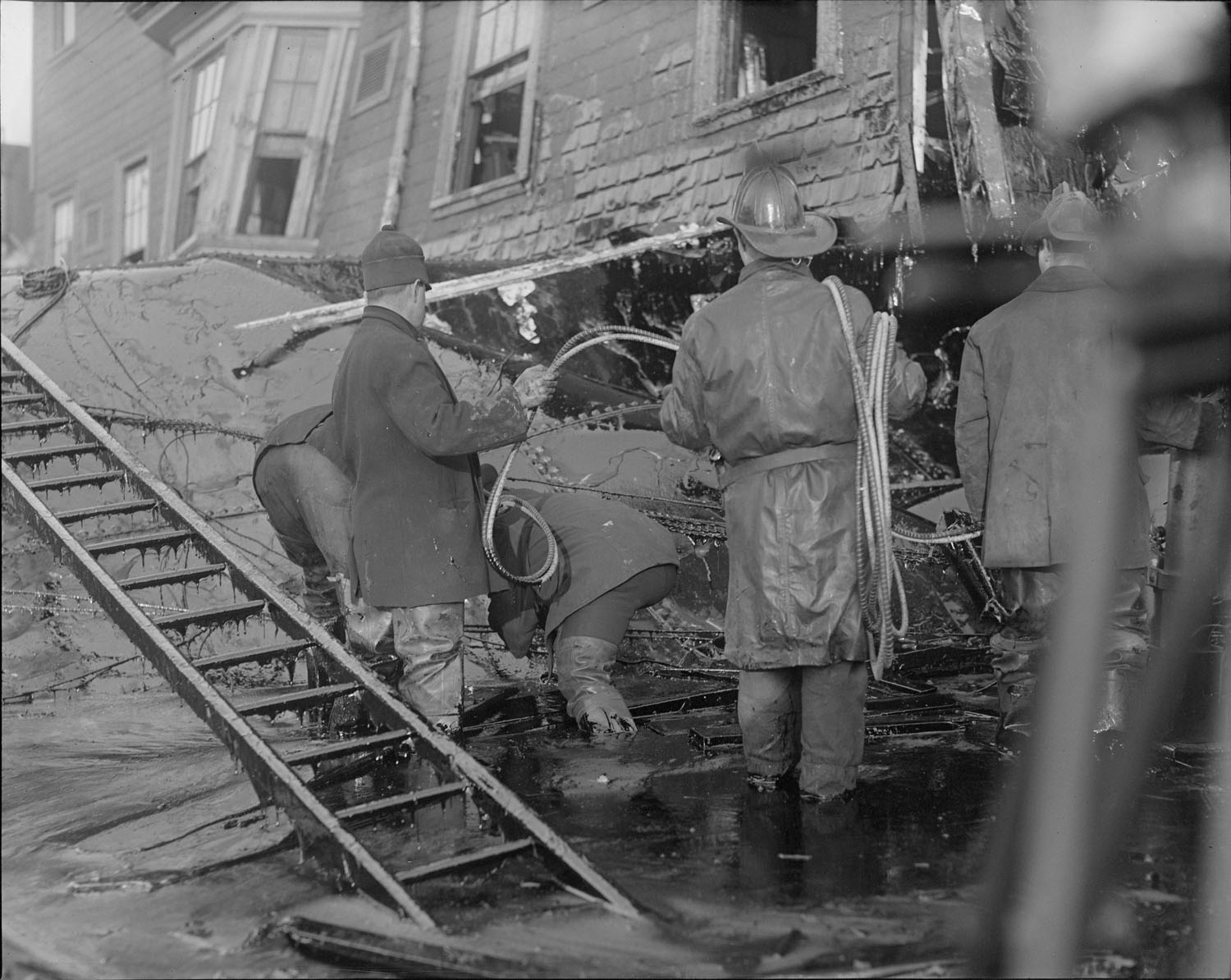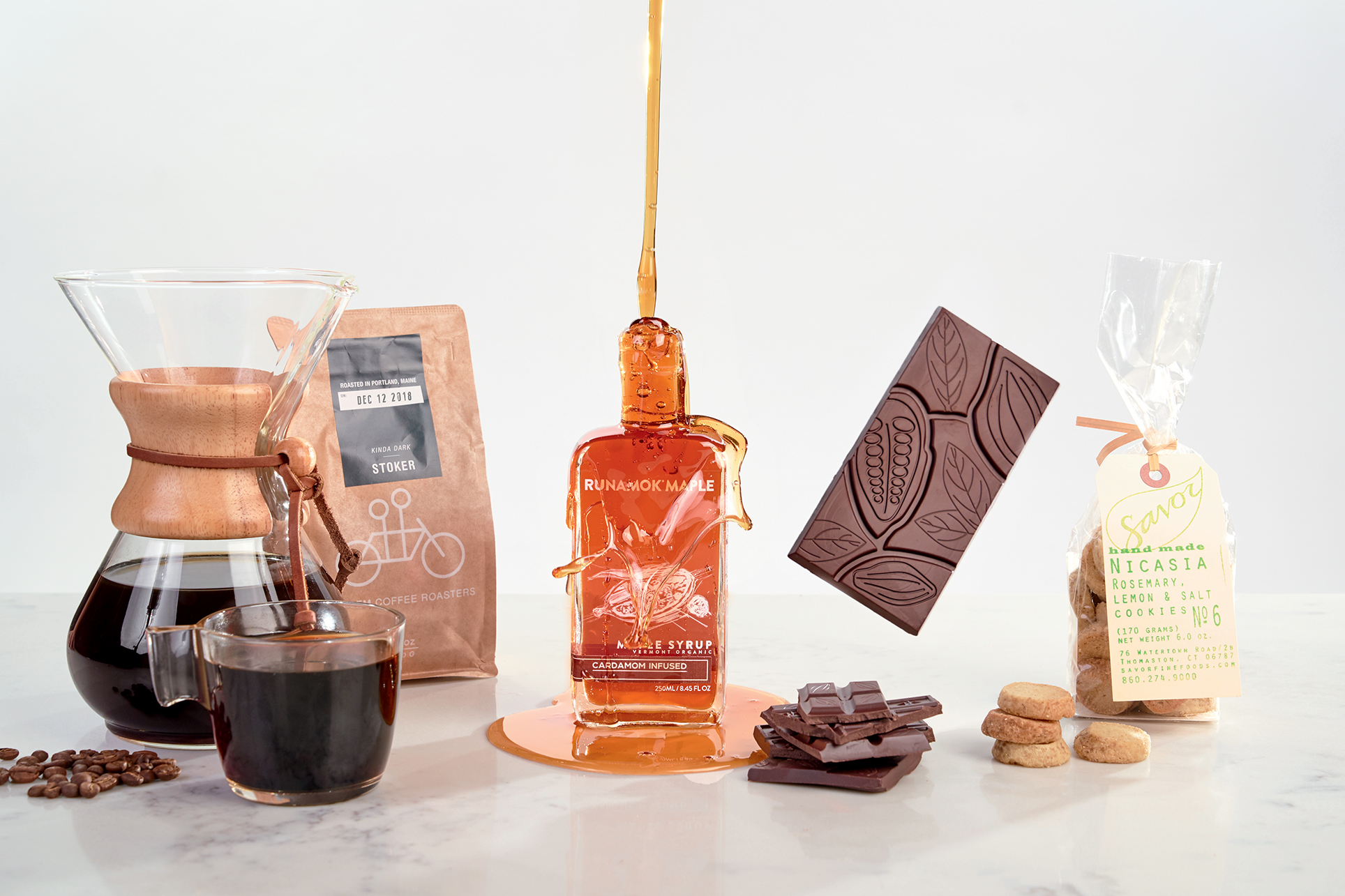Episode 128: The Molasses Flood That Changed Boston Forever; States Battle Over Business With Mega Subsidy Deals

This week on NEXT:
We discuss how the government shutdown is affecting individuals in New England, including through a growing backlog of cases at Boston’s immigration court.
Plus, we learn about how states around our region use subsidies to lure businesses.
On the hundredth anniversary of the “Great Boston Molasses Flood,” we hear about how the event shaped the relationship between business and government.
Finally, we explore the best New England food of the past year from Yankee Magazine’s Senior Food Editor, Amy Traverso.
It’s NEXT!
Photo above: Firemen standing in thick molasses after the Boston Molasses Flood in 1919. Courtesy of the Boston Public Library, Leslie Jones Collection.
Border Security and the Government Shutdown
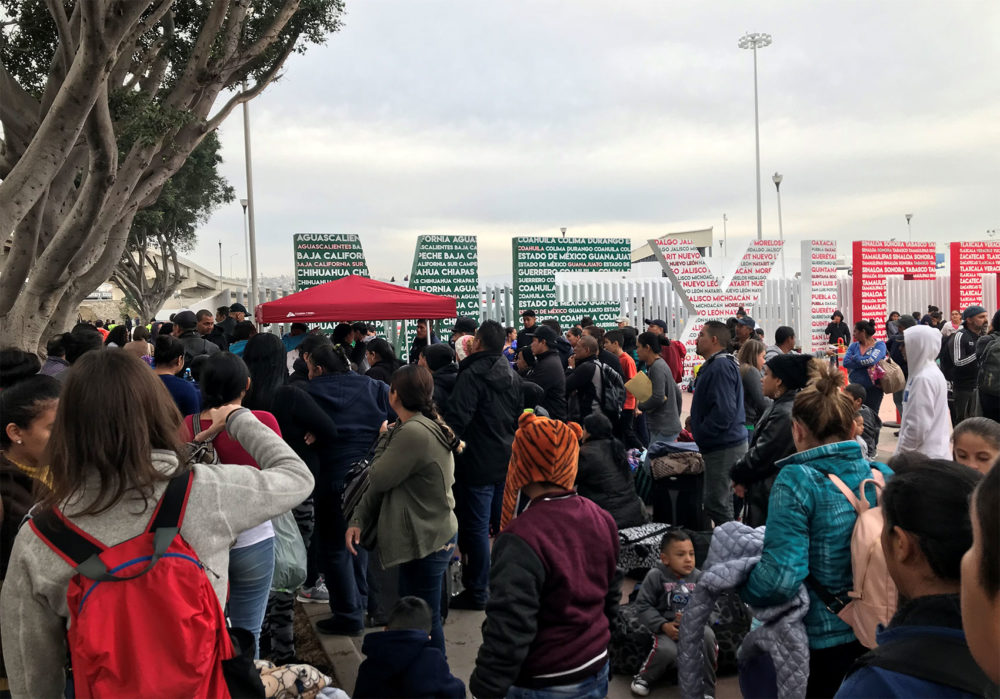
Families wait at “El Chaparral,” a border crossing near San Ysidro, California, to hear which names are called from the asylum waitlist. Photo by Shannon Dooling for WBUR
As the government shutdown continues, President Trump addressed the nation to make the case for erecting a border wall between the U.S. and Mexico.
WBUR’s Shannon Dooling recently returned from Tijuana. She joins us to discuss how President Trump’s description of the situation along the Southern Border compares with what she saw.
How the Shutdown Impacts Boston’s Immigration Court
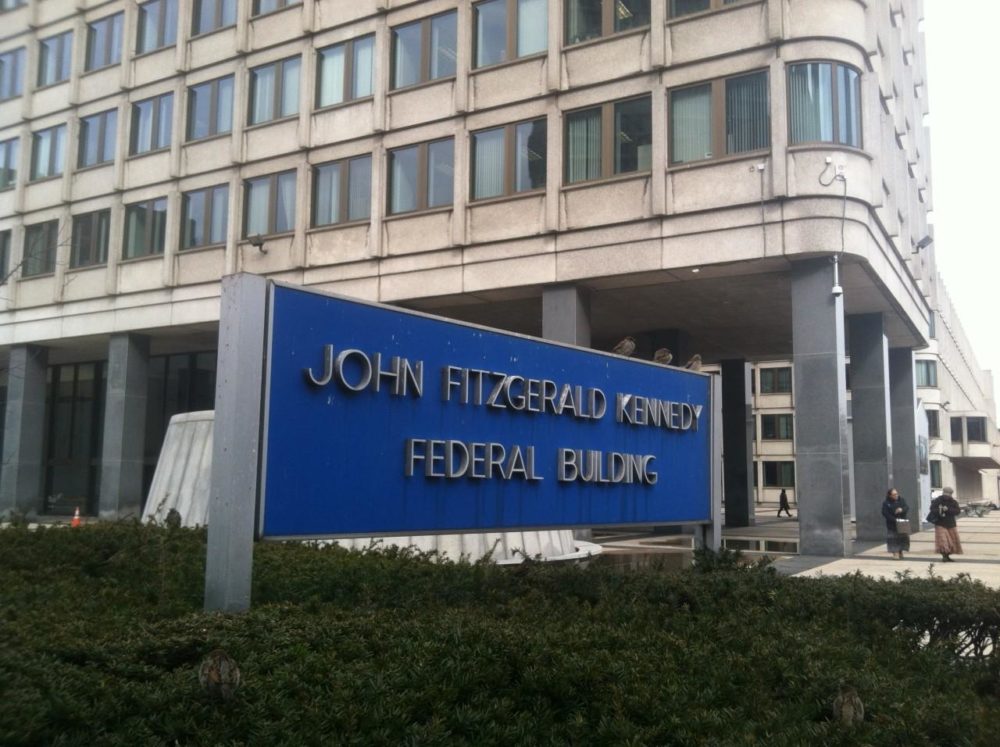
John F. Kennedy Federal Building in Boston houses the Boston Immigration Court. Photo by Curt Nickisch for WBUR
As the shutdown of the federal government continues, the backlog of cases in immigration court continues to grow. Some experts worry that immigrants missing court because of the shutdown are being denied due process.
But Simón Rios reports, some immigration advocates see the shutdown as a welcome respite.
Policy Could Change Status of Some Vietnamese Living in the U.S.
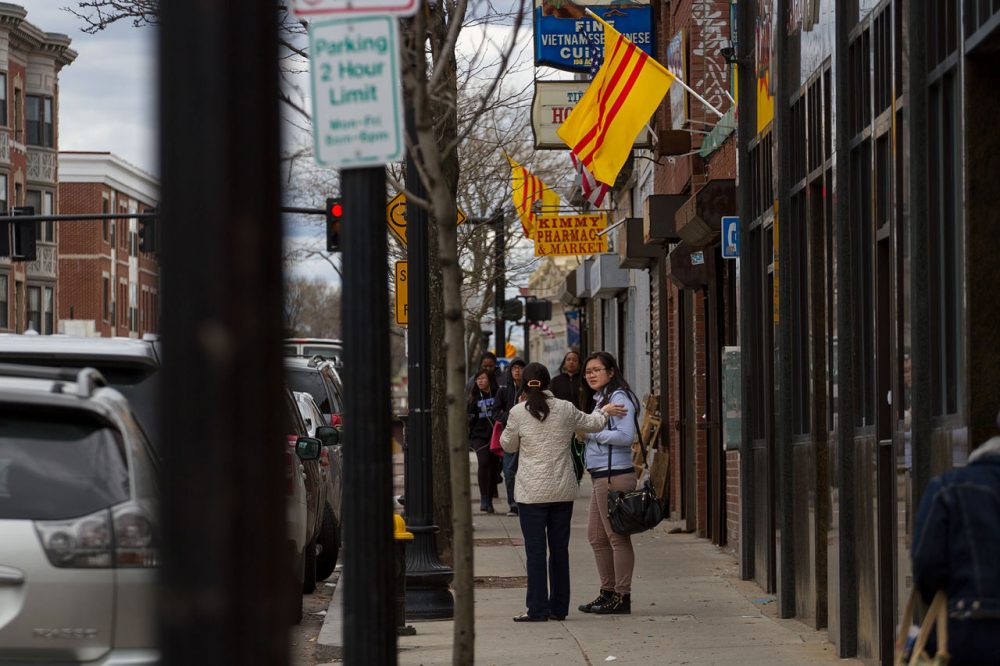
South Vietnamese flags fly over businesses down Boston’s Dorchester Avenue ahead of the 40th anniversary of the fall of Saigon in 2015. Photo by Jesse Costa for WBUR
It’s not just border policy that the Trump administration is trying to change. There’s also an effort to target some Vietnamese immigrants who arrived in the U.S. before 1995. The Boston area alone is home to over 50,000 Vietnamese, many of whom arrived here following the war.
Loan Dao, Professor of Asian American Studies and Transnational Cultural and Community Studies at the University of Massachusetts Boston, says many Vietnamese came to this country directly from rural poverty and war in their home country. And the U.S. wasn’t very accepting of them. Even minor crimes more than 30 years ago could mean deportation for people who’ve raised families, started businesses and served their time.
In an opinion piece for CommonWealth Magazine, Dao wrote, “If forced back to Vietnam, these neighbors would face a frightening future of social ostracism and possible government repression.”
Loan Dao joins us to discuss the policy that has protected these immigrants in the past, and what this change would mean for international relations.
How New England States Use Subsidies To Lure Business
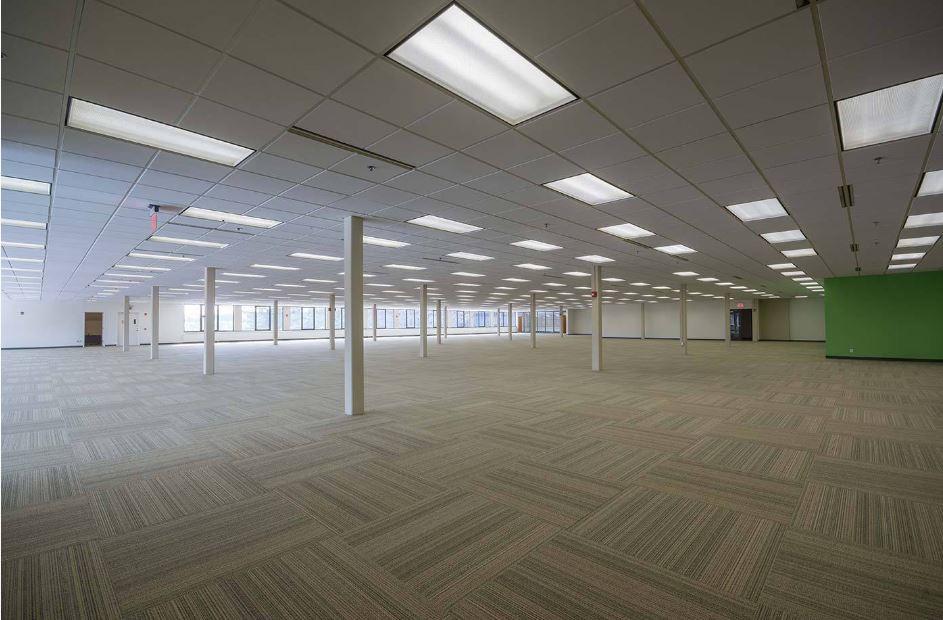
Available office space at 3000 Goffs Falls Road, where BAE Systems plans to locate 400-800 new positions. Photo courtesy the state of New Hampshire
States compete with each other to bring in businesses, and to keep the businesses they have. And the tool they use is corporate subsidies. That could mean tax breaks, a promise to build infrastructure or train workers. We’ve seen it throughout New England, from the recent bids for Amazon HQ2 to companies like General Electric that were lured from one state to the next. But what do we know about these incentive programs and how they work?
We invited Greg Leroy from Good Jobs First, an organization that’s been tracking corporate subsidies for years, to discuss how New England states use subsidies.
Plus, during his inaugural address, New Hampshire’s Governor Chris Sununu talked up the state’s booming economy, and the business tax cuts that he says are attracting companies to the state. He says a light touch by his government is spurring growth and benefiting workers. As NHPR’s Todd Bookman reports, there’s another important tool being used to court companies to the state that you’ll likely never hear mentioned in a political speech.
Remembering the Great Boston Molasses Flood
On January 15, 1919, a tank of hot molasses burst, releasing a thick, sugary tsunami into the streets of Boston’s North End.
“The Great Molasses Flood” was a major disaster for the city. It killed 21 people, injured 150, and shaped the relationship between business and government as we know it. On its centennial, reporter Julia Press looks back at the history, the science, and the impact of the Great Molasses Flood.
New England Food Awards
- The winners of the 2018 Yankee Magazine Editors’ Choice Food Awards. Photo courtesy of Yankee Magazine
- The winners of the 2018 Yankee Magazine Editors’ Choice Food Awards. Photo courtesy of Yankee Magazine
- The winners of the 2018 Yankee Magazine Editors’ Choice Food Awards. Photo courtesy of Yankee Magazine
The food landscape of our region has come a long way in the last 100 years. Today New England cuisine is characterized by local farm-to-table producers, and each year Yankee Magazine scours our landscape to celebrate the best artisan New England products through the Editors’ Food Choice Awards.
We invited back Amy Traverso, the senior food editor of Yankee Magazine to tell us about some of the tastiest food in our region.
Check out the full list of winners of the Yankee Magazine Editors Choice Food Awards.
About NEXT
NEXT is produced at Connecticut Public Radio
Host: John Dankosky
Producer: Lily Tyson
Digital Producer: Carlos Mejia
Senior Director: Catie Talarski
Contributors to this episode: Shannon Dooling, Simón Rios, Nancy Cohen, Frankie Graziano, Todd Bookman, Julia Press
Music: Todd Merrell, “New England” by Goodnight Blue Moon, “Buckets of Rain” by Bob Dylan, “Strange Boy” by The Shacks, “Vesuvius” by Sufjan Stevens
—
New to NEXT? You can find every episode or one you missed within our archives.
We need your feedback! Send critiques, suggestions, questions, and ideas to next@ctpublic.org. Help us spread the word! If you like what you hear, rate and review us on iTunes.

